Overview
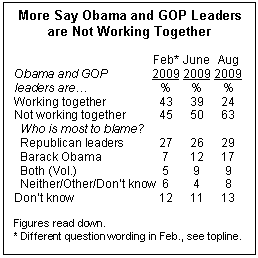
Americans are in an increasingly sour mood about Washington. Barack Obama’s approval ratings continue to inch downward and a growing proportion of Americans (63%) think that the president and Republican leaders are not working together to deal with important issues facing the nation; in June, 50% said the two sides were not cooperating. While more people continue to blame Republican leaders than blame Obama, the percentage saying the president is at fault (17%) is higher now than in June (12%) and much higher than in February (7%)
In the same vein, the new poll finds favorable ratings of the Democratic Party have declined sharply since spring. Just 49% now say they have a favorable view of the Democratic Party. This compares with a 59% favorable rating for the party as recently as April and 62% shortly before Obama took office in January. Opinion of the Republican Party, which stands at 40%, has not changed all year.
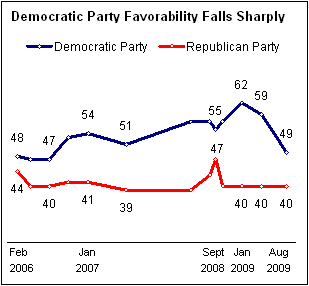
Public opinion about the national economy also is stuck, and on balance remains negative. Fully 90% rate economic conditions negatively – 52% say they are poor and 38% only fair. These evaluations are on par with views of the economy in June, which had shown some improvement from earlier in the year. Similarly, the proportion of Americans expecting the economy to improve over the next year, which increased from March to June, has now stabilized.
However, the public’s personal financial assessments have become more bearish in the new poll than they were two months ago; currently, 55% say they expect their financial situation to improve over the next year, down from 63% in June. Since June, the decline in personal financial optimism has been particularly pronounced among middle-income and affluent Americans, as well as among Republicans and independents.
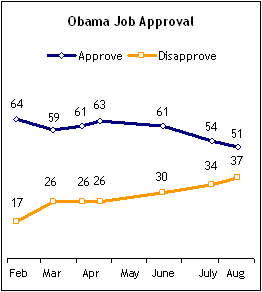
The latest national survey by the Pew Research Center for the People & the Press, conducted Aug. 11-17 in English and Spanish among 2,010 adults reached on landlines and cell phones, finds that 51% now approve of Obama’s job performance while 37% disapprove. While that is largely unchanged from July (54%), it is down 10 points from June (61%).
Independents, who approved of Obama’s job performance by nearly two-to-one in June (56% to 29%) are now about evenly divided: 45% approve while 43% disapprove.
The survey finds that with public views of the economy remaining predominantly negative, there are no signs that Americans are ready to increase personal spending. Fully 81% report they have cut back on vacation spending, been eating at restaurants less often, or have delayed purchasing a car or major home items. This is largely unchanged from June (76%) or, for that matter, from February (79%), when overall views of the economy were even more negative.
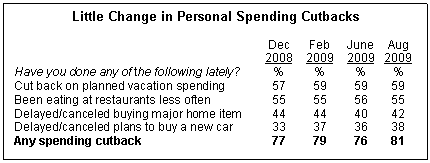
As in the past, more people say they are cutting back on spending because they worry their financial situation might get worse rather than because it actually has gotten worse. Nearly half (47%) of those who have delayed or cut back spending say they have done so out of fear about the future, while 34% say they are cutting back because their finances have gotten worse.
The job situation continues to worry more Americans than other financial problems. More than four-in-ten (44%) say the job situation is the economic issue that most worries them, followed by rising prices (26%), problems in the financial markets (14%) and declining real estate values (9%). This hierarchy of worries is little changed from previous surveys this year.
Health Care: More Attentiveness Among Conservatives
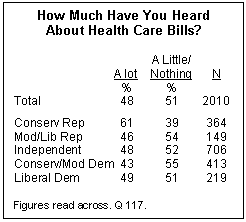
As the debate over health care continues, an overwhelming proportion of Americans (90%) say they have heard at least a little about bills being proposed by President Obama and Congress to overhaul the health care system. Nearly half of the public (48%) says they have heard a lot about the proposed legislation. Notably, 61% of conservative Republicans say they are hearing a lot about health care legislation, substantially more than in other political groups.
The poll indicates that anger about the legislative proposals under consideration is not especially widespread. Just 18% say they would be angry if health care legislation proposed by the president and Congress were to pass; only half as many (9%) say they would be angry if the bills do not pass.
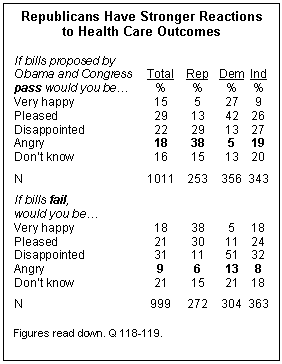
Overall, reactions to possible outcomes of the legislative debate are mixed: 44% say they would be very happy or pleased if the bills proposed by Obama and Congress pass, while 40% say they would be disappointed or angry. When a separate group of respondents was asked about their reaction if the bills fail, about as many say they would be very happy or pleased (39%) as disappointed or angry (40%).
More Republicans have strong reactions to the bills’ prospects than do Democrats. Nearly four-in-ten (38%) say they would be angry if the current reform proposals were enacted. By comparison, just 13% of Democrats say they would be angry if the legislation proposed by Obama and Congress does not become law. Rather, most Democrats (51%) say would be disappointed.
Similarly, while 38% of Republicans say would be very happy if the bills fail, a smaller percentage of Democrats (27%) say they would be very happy if the bills succeed.
Independents generally do not express as intense reactions to possible outcomes of the health care debate than do Republicans or Democrats. However, while 19% of independents say they would be angry if the health care bills pass, just 8% say they would be angry if the bills do not pass.

Democratic Party’s Falling Favorability
The decline in the Democratic Party’s favorable ratings has come across party lines, but the change is especially large among independents. Only 40% of independents give a favorable rating to the Democratic Party, down 12 points since April.
Independents’ views of the Republican Party have not changed since April (41% favorable then, 40% today). As a result, as many independents now express positive views of the GOP as of the Democratic Party.
Democrats continue to express positive views of their own party, but favorable ratings have slipped from 91% in April to 85% now. Somewhat fewer Republicans also rate the Democratic Party favorably (17%) than did so in April (24%). More than three-fourths of Republicans (78%) rate the GOP favorably, which is virtually unchanged from April.
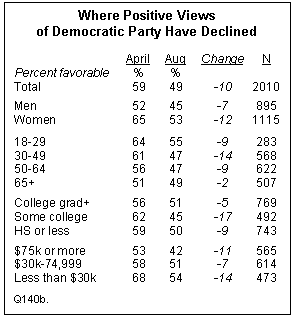
The Democratic Party’s favorability has decreased among most demographic groups. The decline has been largest among those with some college education (62% in April to 45% now). Similarly, 68% of people with family incomes less than $30,000 expressed a favorable opinion of the Democratic Party in April compared with 54% now. A similar decline is evident among those 30 to 49 (61% to 47%).
Views of the Economy and Personal Finances
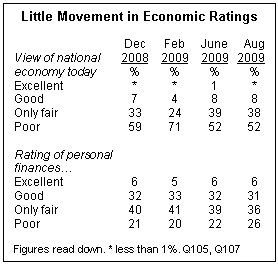
Although the Obama administration and some economists have touted the early signs of an economic recovery, the public is, if anything, more gloomy about the economy than it was two months ago. Ratings of the national economic situation remain dismal, with 52% saying the economy is in poor shape, and 38% saying its condition is “only fair.” People’s assessments of their own financial situation are less negative, but the number describing their finances as “poor” ticked up from 22% in June to 26% today.
The most notable change in economic views is the decline in the number of people who expect their financial situation to improve over the next year. The June survey found a nine-point increase in optimism since February (from 54% to 63%). In the c
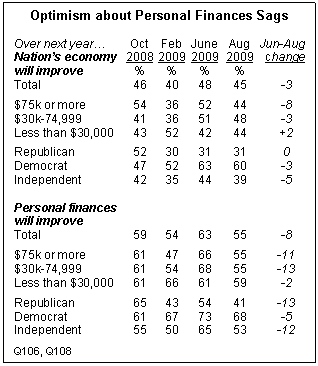
urrent survey, the proportion expecting their financial situation to improve has fallen back to 55%. Much of the change since June has occurred among middle- and upper-income people. There was no rise in the percentage who think their situation will worsen; instead, the number expecting things to stay the same has grown.
Views about the prospects for a national economic recovery are highly partisan, as they have been since President Obama took office. Nearly twice as many Democrats as Republicans (60% vs. 31%) say they expect the nation’s economy to improve over the next year. Independents are somewhat closer to Republicans on this question; just 39% see improvement in the next year.
While a large majority of Americans (80%) say they have delayed or cut back spending in at least one of several areas, their reasons for doing do have not changed. As has been the case in the past, those who report cutting their
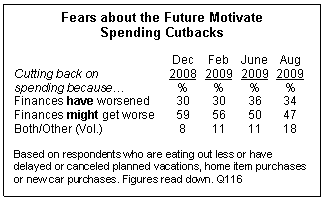
spending say they are doing so more as a precaution than because they have been forced to do so by their financial situation. About one-third of those reporting cutbacks (34%) say their personal finances have worsened and led them to make the changes; 47% say they are cutting back because their finances might get worse in the future.




